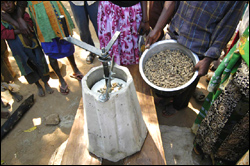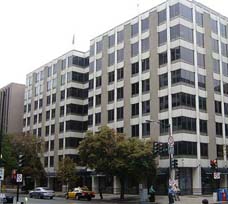2006.07.26: July 26, 2006: Headlines: COS - Philippines: Agriculture: Engieering: Inventions: eanuts: Ohmy News: RPCV Jock Brandis, develops the Universal Nut Sheller for the peanut industry in the Philippines
Peace Corps Online:
Directory:
Philippines:
Peace Corps Philippines:
The Peace Corps in the Philippines:
2006.07.26: July 26, 2006: Headlines: COS - Philippines: Agriculture: Engieering: Inventions: eanuts: Ohmy News: RPCV Jock Brandis, develops the Universal Nut Sheller for the peanut industry in the Philippines
RPCV Jock Brandis, develops the Universal Nut Sheller for the peanut industry in the Philippines

Invented by Brandis, the nut sheller can shell peanuts 40 times faster than by hand. Its invention coincided with his establishment of The Full Belly project, which aims "to relieve hunger through appropriate agricultural technology." The goal of the organization is to distribute these machines around the world and make peanuts the number one source of protein of third world countries. Brandis also didn't patent his invention because he believes that it is "a gift to those in need."
RPCV Jock Brandis, develops the Universal Nut Sheller for the peanut industry in the Philippines
Cracking Peanuts to Solve World Hunger
New invention aims to promote peanuts as protein source for developing countries
Tuesday Gutierrez (tuesday74)
Published 2006-07-26 16:02 (KST)
Caption: The Universal Nut Sheller ©2006 Full Belly Project
For most Filipinos, eating peanuts (mani) is an activity almost synonymous to popcorn-munching for Americans. In the narrow streets of Metro Manila, mani easily outsell cigarettes. (No one would disagree with me when I say that the best pica-pica are those big oily and salty roasted golden peanuts mixed with garlic.)
The peanut industry is not only huge in the Philippines, but reaches the farthest corners of the globe to almost 100 countries, feeding 500 million people and serving as an important source of protein. It also provides livelihood for poor people of developing countries, as the demand for imported peanuts in the worldwide market surpasses 20,000 metric tones a year. Most come from China and India, because of their production capability to yield peanuts in volume.
But for such a big industry, the agricultural technology of peanuts is still trailing. People are still shelling peanuts by hand, painfully one by one. (To save on fuel, peanuts are left dried under the sun, which makes their shell hard to open.) In Africa, most of those who do the work are women.
Fortunately, someone has finally cracked the hard "nut case". Jock Brandis, an ex-Peace Corps volunteer and light and sounds engineer, while visiting a friend in Mali saw the heart of the problem and decided to use his technical skills to provide an agricultural solution. Thus the Universal Nut Sheller was born.
Invented by Brandis, the nut sheller can shell peanuts 40 times faster than by hand. Its invention coincided with his establishment of The Full Belly project, which aims "to relieve hunger through appropriate agricultural technology." The goal of the organization is to distribute these machines around the world and make peanuts the number one source of protein of third world countries. Brandis also didn't patent his invention because he believes that it is "a gift to those in need."
Not only can peanuts provide livelihood, but they contains highly nutritious properties that could solve worldwide hunger and eventually poverty -- this time on a full stomach. And for women who are the bearers of the shelling burden, it also provides a liberation.
The machine is made of concrete and simple metal parts and only costs US$50 to make. It can shell "50 kilograms of peanuts per hour, and one machine can serve the needs of a village of 2,000. Its life expectancy is 25 years."
The Full Belly Project is now working in Uganda, Senegal, Zambia, and Ghana. Filipino MIT graduate and Centromigrante social entrepreneur Illac Diaz has also collaborated with the Full Belly Project to bring the sheller to the Philippines. With the help of a local cement company, Diaz and his team will teach locals how to build the machines, this time attaching it to a bicycle system to yield more shelled nuts.
In the Philippines, most peanut farms are located in the semi-arid and drought-prone areas where poor communities are found. It takes one week on a nine-hour work day to shell a two-hectare peanut field.
With the Universal Nut Sheller, Philippine farmers will take a crack in the future at the world peanut market.
The Full Belly Project shows a detailed instruction on how to build the nut shellers. Please check the Web site for more details.
When this story was posted in August 2006, this was on the front page of PCOL:





Peace Corps Online The Independent News Forum serving Returned Peace Corps Volunteers
 | Peace Corps' Screening and Medical Clearance
The purpose of Peace Corps' screening and medical clearance process is to ensure safe accommodation for applicants and minimize undue risk exposure for volunteers to allow PCVS to complete their service without compromising their entry health status. To further these goals, PCOL has obtained a copy of the Peace Corps Screening Guidelines Manual through the Freedom of Information Act (FOIA) and has posted it in the "Peace Corps Library." Applicants and Medical Professionals (especially those who have already served as volunteers) are urged to review the guidelines and leave their comments and suggestions. Then read the story of one RPCV's journey through medical screening and his suggestions for changes to the process. |
 | Gates charity races to spend billions
Warren E. Buffett’s gift of $31 billion to the Bill and Melinda Gates Foundation means that for tax reasons, starting in 2009, the foundation must distribute $3 billion annually, or a little more than twice what it distributed last year.
PCOL Comment: The Foundation says that "preventing the spread of HIV is the most durable long-term solution to the AIDS epidemic, and a top priority for the foundation." Peace Corps Volunteers and Returned Volunteers have been doing just that in AIDS Education for the past 15 years. Why not consider a $100M annual contribution to the Peace Corps to put 2,500 additional volunteers in the field to expand AIDS education worldwide? |
 | The Peace Corps is "fashionable" again
The LA Times says that "the Peace Corps is booming again and "It's hard to know exactly what's behind the resurgence." PCOL Comment: Since the founding of the Peace Corps 45 years ago, Americans have answered Kennedy's call: "Ask not what your country can do for you--ask what you can do for your country. My fellow citizens of the world: ask not what America will do for you, but what together we can do for the freedom of man." Over 182,000 have served. Another 200,000 have applied and been unable to serve because of lack of Congressional funding. The Peace Corps has never gone out of fashion. It's Congress that hasn't been keeping pace. |
 | Changing the Face of Hunger
In his new book, Former Congressman Tony Hall (RPCV Thailand) says humanitarian aid is the most potent weapon the United States can deploy against terrorism. An evangelical Christian, he is a big believer in faith-based organizations in the fight against hunger. Members of Congress have recently recommended that Hall be appointed special envoy to Sudan to focus on ending the genocide in Darfur. |
 | PC will not return to East Timor in 2006
Volunteers serving in East Timor have safely left the country as a result of the recent civil unrest and government instability. Latest: The Peace Corps has informed us that at this time, the Peace Corps has no plans to re-enter the country in 2006. The Peace Corps recently sent a letter offering eligible volunteers the opportunity to reinstate their service in another country. |
 | Chris Dodd considers run for the White House
Senator Chris Dodd plans to spend the next six to eight months raising money and reaching out to Democrats around the country to gauge his viability as a candidate. Just how far Dodd can go depends largely on his ability to reach Democrats looking for an alternative to Hillary Clinton. PCOL Comment: Dodd served as a Volunteer in the Dominican Republic and has been one of the strongest supporters of the Peace Corps in Congress. |
 | Vasquez testifies before Senate Committee
Director Vasquez testifies before the Senate Foreign Relations Committee on his nomination as the new Representative to the United Nations Agencies for Food and Agriculture replacing Tony Hall. He has been the third longest serving Peace Corps Director after Loret Ruppe Miller and Sargent Shriver. PCOL Comment: Read our thanks to Director Vasquez for his service to the Peace Corps. |
 | Peace Corps stonewalls on FOIA request
The Ashland Daily Tidings reports that Peace Corps has blocked their request for information on the Volkart case. "After the Tidings requested information pertaining to why Volkart was denied the position — on March 2 — the newspaper received a letter from the Peace Corps FOIA officer stating the requested information was protected under an exemption of the act." The Dayton Daily News had similar problems with FOIA requests for their award winning series on Volunteer Safety and Security. |
 | PCOL readership increases 100%
Monthly readership on "Peace Corps Online" has increased in the past twelve months to 350,000 visitors - over eleven thousand every day - a 100% increase since this time last year. Thanks again, RPCVs and Friends of the Peace Corps, for making PCOL your source of information for the Peace Corps community. And thanks for supporting the Peace Corps Library and History of the Peace Corps. Stay tuned, the best is yet to come. |
 | History of the Peace Corps
PCOL is proud to announce that Phase One of the "History of the Peace Corps" is now available online. This installment includes over 5,000 pages of primary source documents from the archives of the Peace Corps including every issue of "Peace Corps News," "Peace Corps Times," "Peace Corps Volunteer," "Action Update," and every annual report of the Peace Corps to Congress since 1961. "Ask Not" is an ongoing project. Read how you can help. |
 | RPCV admits to abuse while in Peace Corps
Timothy Ronald Obert has pleaded guilty to sexually abusing a minor in Costa Rica while serving there as a Peace Corps volunteer. "The Peace Corps has a zero tolerance policy for misconduct that violates the law or standards of conduct established by the Peace Corps," said Peace Corps Director Gaddi H. Vasquez. Could inadequate screening have been partly to blame? Mr. Obert's resume, which he had submitted to the Peace Corps in support of his application to become a Peace Corps Volunteer, showed that he had repeatedly sought and obtained positions working with underprivileged children. Read what RPCVs have to say about this case. |
 | Why blurring the lines puts PCVs in danger
When the National Call to Service legislation was amended to include Peace Corps in December of 2002, this country had not yet invaded Iraq and was not in prolonged military engagement in the Middle East, as it is now. Read the story of how one volunteer spent three years in captivity from 1976 to 1980 as the hostage of a insurrection group in Colombia in Joanne Marie Roll's op-ed on why this legislation may put soldier/PCVs in the same kind of danger. Latest: Read the ongoing dialog on the subject. |
Read the stories and leave your comments.

Some postings on Peace Corps Online are provided to the individual members of this group without permission of the copyright owner for the non-profit purposes of criticism, comment, education, scholarship, and research under the "Fair Use" provisions of U.S. Government copyright laws and they may not be distributed further without permission of the copyright owner. Peace Corps Online does not vouch for the accuracy of the content of the postings, which is the sole responsibility of the copyright holder.
Story Source: Ohmy News
This story has been posted in the following forums: : Headlines; COS - Philippines; Agriculture; Engieering; Inventions; eanuts
PCOL33763
19

























